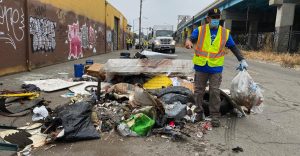#NNPA BlackPress
Neglect, Disrespect of Puerto Rico by Trump Administration Continues
NNPA NEWSWIRE — “The Donald Trump administration’s response to the crisis reveals that Puerto Ricans are racialized as subordinate, despite their US citizenship, said Dr. Pedro Cabán, Professor of Latin American, Caribbean and US Latino Studies at University at the State University of New York in Albany. “Trump’s racially charged statements resurrected long dormant, degrading characterizations of Puerto Ricans as lacking the capacity and will to fend for themselves.”
Published
7 years agoon
By
Oakland Post
By Barrington M. Salmon, NNPA Newswire Contributor
@bsalmondc
President Donald Trump reignited the antipathy he has towards Puerto Rico when, in a recent meeting with Congressional Republicans, he reiterated his desire to deny any but the most basic funds to Puerto Rico.
He told senators in a closed-door meeting on March 26 he thinks Puerto Rico got too much funding compared to mainland states like Florida, Georgia and Texas. In a CNN exclusive by Jim Acosta and Kevin Liptak, Trump said he is willing to supplement a shortfall in the island’s food stamp program to the tune of $600 million but refuses to do more.
This posture infuriated Gov. Ricardo Rosselló who reacted angrily to Trump’s comments, calling him a bully and accusing him of ignoring the island’s dire post-hurricane needs. Rosselló told CNN that he would not sit back and allow his officials to be bullied by the White House.
“If the bully gets close, I’ll punch the bully in the mouth,” he said. “It would be a mistake to confuse courtesy with courage.”
In various media reports, Rosselló described the president’s remarks as “irresponsible, regrettable and, above all, unjustified,” and “below the dignity of a sitting president.”
“I invite the president to stop listening to ignorant and completely wrong advice,” Rosselló added in a statement last week. “Instead he should come to Puerto Rico to hear firsthand from the people on the ground. I invite him to put all of the resources at his disposal to help Americans in Puerto Rico, like he did for Texas and Alabama. No more, no less … What I am aiming to do is make sure that reason prevails, that empathy prevails, that equality prevails and that we can have a discussion.”
Trump has complained repeatedly that Puerto Rican government officials are wasting the money it has already received, a statement that Rosselló strenuously pushed back against.
“He treats us as second-class citizens, that’s for sure,” he said. “And my consideration is I just want the opportunity to explain to him why the data and information he’s getting is wrong. I don’t think getting into a kicking and screaming match with the President does any good. I don’t think anyone can beat the President in a kicking and screaming match. What I am aiming to do is make sure reason prevails, that empathy prevails, that equality prevails, and that we can have a discussion.”
Both Rosselló and San Juan Mayor Carmen Yulín Cruz, have sought meetings with Trump for months but he has refused. Rosselló met with White House officials and was also on Capitol Hill last week discussing the prospects of Puerto Rican statehood with lawmakers.
Florida Sen. Marco Rubio said Trump supports the federal government offering $600 million to Puerto Rico to bridge a food stamp shortfall caused by commonwealth officials slashing benefits, but the president is resistant to the US government sending disaster aid dollars and money to rebuild antiquated water systems and make them more resilient to future storms.
Overall, more than 580,000 people in Puerto Rico rely on the food stamp program and more than 40 percent of them live below the poverty line, Rossello said.
According to the Associated Press, the Government Accountability Office estimates that Puerto Rico will need about $132 billion to rebuild from Maria. And so far, the Federal Emergency Management Agency has obligated almost $4 billion in public assistance grant funding to the island and Congress has released $11 billion.
The Democratic House pulled together an almost $14 billion aid package that sat in the Senate for weeks, then Trump’s stubborn refusal to approve additional funding led them to block a $13.5 billion Republican disaster aid bill on April 2. The Dems argued that without more adequate aid for Puerto Rico they wouldn’t support the bill.
Trump criticized Democrats via Twitter for “fighting” the disaster relief bill and he continues to argue that Puerto Rican officials are using federal funds to pay off its debts, an assertion the officials strenuously deny.
“I want to be very clear: Not a single federal dollar has been used to make debt payments,” Rosselló said. “Mr. President: Enough with the insults and demeaning mischaracterizations. We are not your political adversaries; we are your citizens,”
According media reports, Sen. Patrick Leahy (D-Vermont), the ranking Democrat on the Appropriations Committee, said Trump was blaming Puerto Rico for failing to spend money that his own administration was refusing to turn over to the island.
“This administration cannot simultaneously hold up recovery dollars for Puerto Rico, and then point to Puerto Rico’s failure to spend it as an excuse not to provide additional assistance,” Leahy said during debate on the Senate floor.
““I’ve given them more money than they’ve ever got,” Trump told reporters at the White House. “Puerto Rico has been taken care of better by Donald Trump than by any living human being. I think the people of Puerto Rico understand it.
Since the storms, Trump has congratulated himself, claiming that the recovery efforts were ‘incredibly successful’ and he praised FEMA and law enforcement as well.
In a recent article in The Independent, a British publication, acting White House Chief of Staff Mick Mulvaney is quoted as saying he believes Puerto Rico will need to find its own way out of the debt crisis. Those knowledgeable about what happens in the White House also say they believe he is encouraging Trump’s negative view of the island.
On April 1, Trump tweeted: “The people of Puerto Rico are GREAT, but the politicians are incompetent or corrupt. Puerto Rico got far more money than Texas & Florida combined, yet their government can’t do anything right, the place is a mess – nothing works.”
San Juan Mayor Carmen Yulín Cruz, who has been trading insults with Trump since shortly after the storms, issued a statement last week saying Trump’s comments are a reminder that he “cannot lead.”
“When faced with a devastating human crisis, Trump augmented it because he made it about himself, not about saving our lives,” she said. “When expected to show empathy, he showed disdain and lack of respect; it seems to be too hard for Trump to know the facts, so he continues to lie about the aid sent to Puerto Rico and about the federal inadequacy towards Puerto Rico.”
As the politicians squabble, the 3.2 million residents of the island commonwealth are still struggling to cope with the crippling and devastating effects of massive back-to-back Category 4 and 5 storms in September 2017. Hurricane Maria destroyed the island’s electrical grid and cellphone towers. In addition, about 80 percent of transmission lines are down and 100 percent of the wires connecting homes and businesses were demolished.
Damage to the island’s infrastructure, especially in the interior and remote villages and communities, left many roads impassable and residents left to fend for themselves. Most affected were the elderly, people needing dialysis or operations for other illnesses, those suffering from asthma and other respiratory diseases, the poor, residents living in poverty, people living in mountain regions, near rivers and in the heart of the commonwealth’s rugged interior and those who live in the southeastern part of the island.
It is now acknowledged that more than 4,000 people died during and after the storms.
The entire ordeal is exacerbated by the fact that Puerto Rico has been in an economic tailspin for the past 12 years. A federally appointed Financial Oversight and Management Board reported last year that the Commonwealth had $74 billion in bond debt and $49 billion in unfunded pension liabilities as of May 2017. The Control Board has implemented draconian austerity measures which has led to demonstrations and unrest since the hurricanes.
Although Puerto Ricans are American citizens, they do not have a voting member of Congress and cannot vote for president. Puerto Ricans have chafed under America’s colonial yolk and that issue is again in plain view with a president who is unapologetic in his support of white nationalists and their agenda, and quite comfortable expressing his disdain for Puerto Rico, as he has towards other majority Black and brown nations.
Critics, pundits and academics say it’s impossible to ignore the role race plays in Trump’s treatment of Puerto Ricans.
In an interview on Tuesday, Rosselló reminded people that Puerto Rico’s population is almost entirely Latino and said that historically, there have been “ethnic undertones” to the treatment of Puerto Ricans by Washington.
“We don’t want special treatment. We just want equal treatment,” he said.
Dr. Lauren Lluveras said Trump has racialized the federal response and wonders in an article titled, ‘Is Racial Bias Driving Trump’s Neglect of Puerto Rico?’ if racial bias fuels his behavior.
“The island is so crippled in part thanks to the federal government’s underwhelming early hurricane response,” said Dr. Lluveras, Postdoctoral Fellow at the Institute for Urban Policy Research and Analysis, University of Texas in Austin. “The historic storm played its role, of course, destroying homes, triggering mudslides and rendering roadways impassible.”
“But the Trump administration delayed dispatching military personnel and material relief until after the hurricane made landfall, and let the Jones Act waiver lapse, reducing the number of ships that can bring aid to the island. These actions have slowed recovery considerably.”
Political Economist Pedro Cabán, an expert in Puerto Rican political and economic change, agreed, saying in a 2017 Jacobin Magazine article titled, ‘Catastrophe and Colonialism’ that Hurricane Maria brutally exposed the crisis of Puerto Rico’s colonial status.
“The Donald Trump administration’s response to the crisis reveals that Puerto Ricans are racialized as subordinate, despite their US citizenship, said Dr. Cabán, Professor of Latin American, Caribbean and US Latino Studies at University at the State University of New York in Albany. “Trump’s racially charged statements resurrected long dormant, degrading characterizations of Puerto Ricans as lacking the capacity and will to fend for themselves.”
FIU’s Dr. Danielle Pilar Clealand said the worst hurricane to hit Puerto Rico in more than 80 years has racialized Puerto Ricans.
“Puerto Rico occupied an elite position in the Caribbean and was considered one of the whiter Caribbean islands, but they’re being racialized,” said Dr. Clealand, assistant professor in the Department of Politics & International Relations at Florida International University’s Cuban Research Institute. “They’ve been racialized as non-whites in ways they haven’t before. This is causing them to change their perspective as it relates to who they are. That component is something to watch as people re-envision where they stand in the world.”

You may like
-
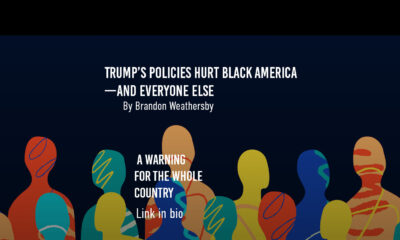

OP-ED: Trump’s Policies Hurt Black America—and Everyone Else
-


Four Stolen Futures: Will H-E-B Do The Right Thing?
-


A Black Friday of Resistance as Americans Push Back
-


Trump’s War on Obamacare Continues as GOP Kills Subsidies
-
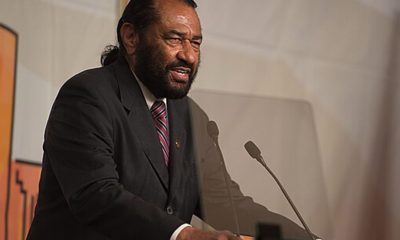

In Major Win for Rep. Al Green, Texas Maps Blocked by Federal Judge
-


OP-ED: By Disappearing Districts: How Racial Gerrymandering is Hollowing Out the Black Electorate
#NNPA BlackPress
PRESS ROOM: NBA Hall of Fame Nominee Terry Cummings Joins 100 Black Men of DeKalb County to Launch Victory & Values Initiative
NNPA NEWSWIRE — NBA Hall of Fame nominee and Basketball Legend Terry Cummings was administered the official member’s oath and ceremonially pinned during a special induction ceremony held on Friday, February 20th.
Published
3 days agoon
February 27, 2026By
admin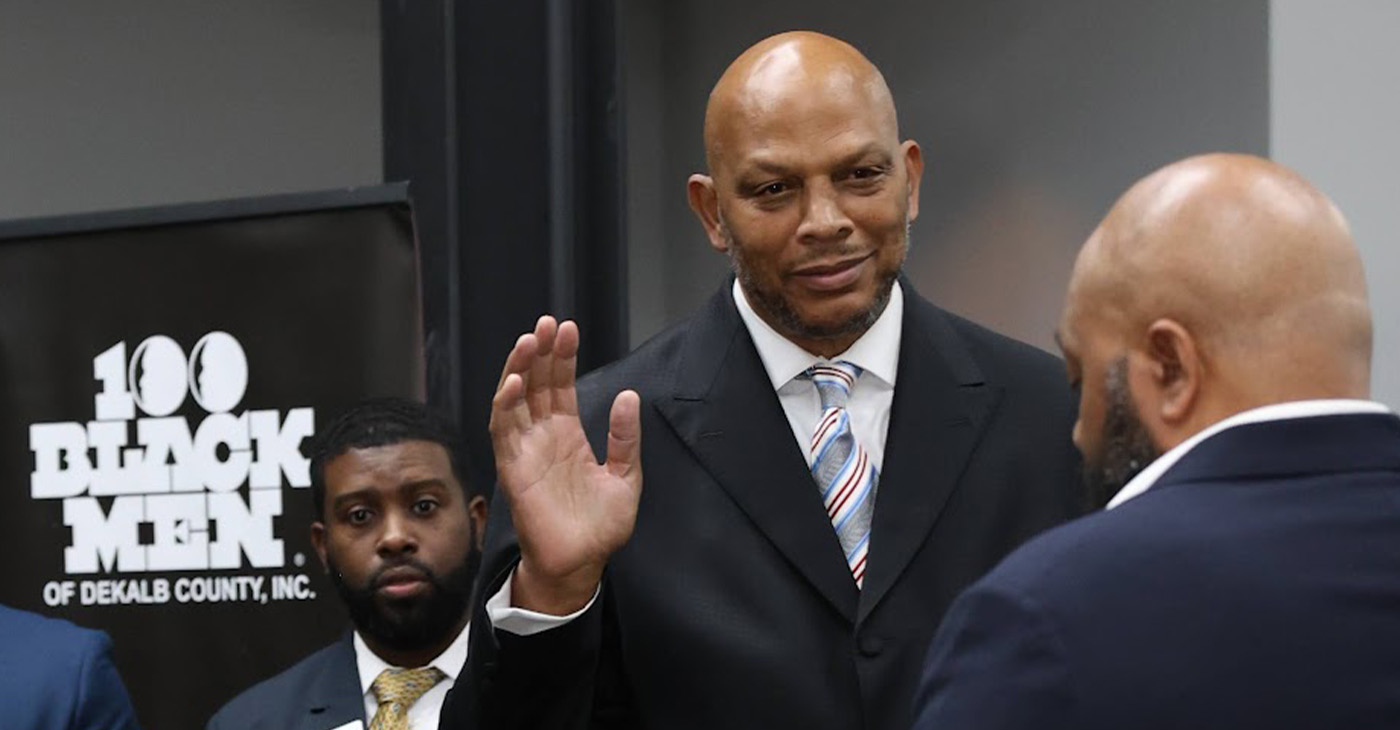
Cummings becomes an honorary member, joining other role model sports stars
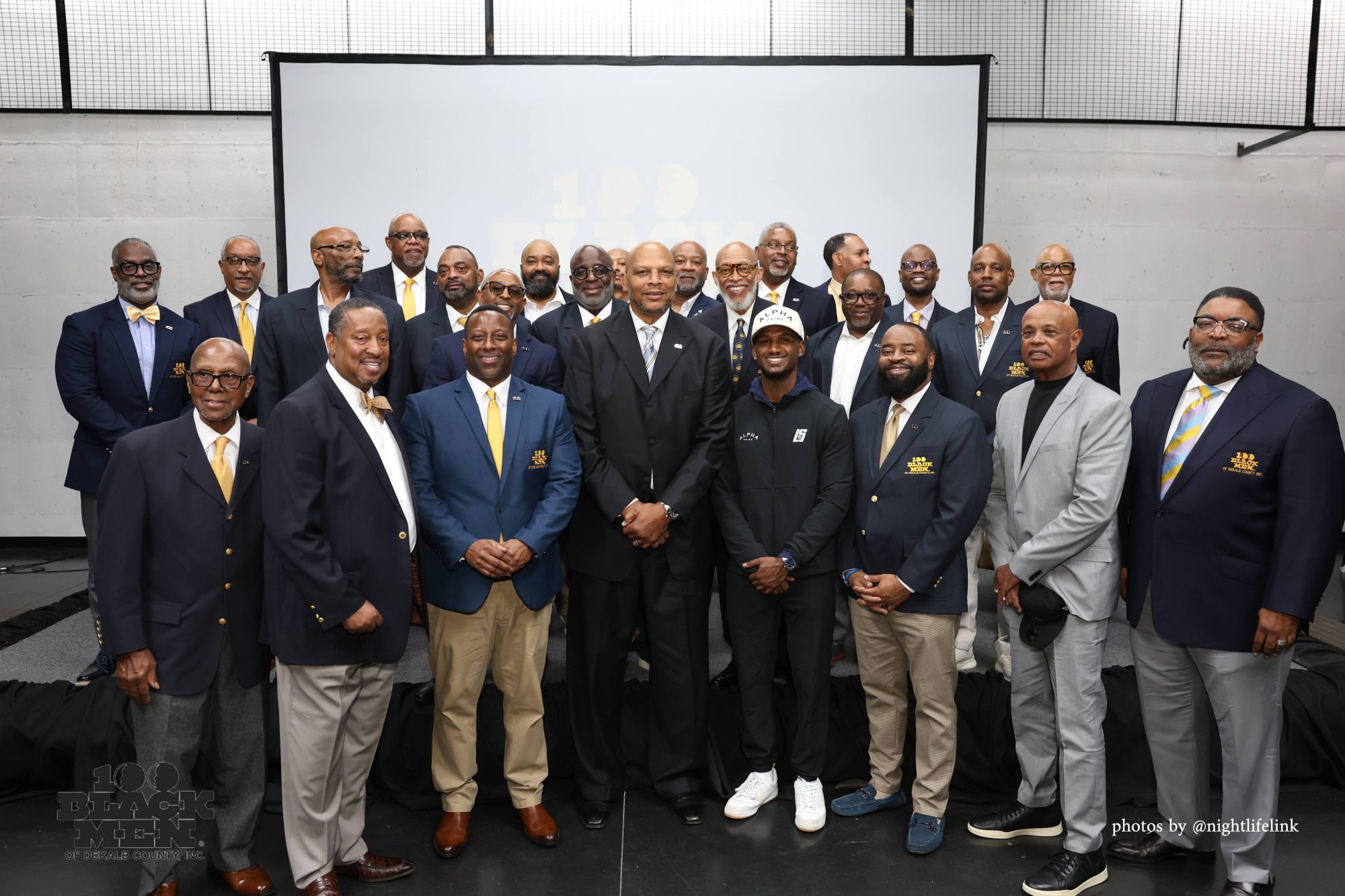
NBA Hall of Fame nominee and Basketball Legend Terry Cummings has officially become an honorary member of the 100 Black Men of DeKalb County, marking a powerful new chapter for the 100 Black Men and youth development across the region.
Cummings was administered the official member’s oath and ceremonially pinned during a special induction ceremony held on Friday, February 20th. The moment signified more than membership — it marked the launch of the organization’s transformative new platform, the Victory & Values Initiative.
The Victory & Values Initiative is a groundbreaking youth development program designed to empower elementary and middle school students through a dynamic blend of sports, mentorship, and STEM exposure. The initiative focuses on building health, discipline, character, leadership, and access to opportunity — creating pathways for long-term academic and personal success.
“This is about more than sports,” said Cummings during the ceremony. “It’s about using the platform of athletics to teach life lessons, create access, and build the next generation of leaders.”
The induction ceremony also featured notable guests including NASCAR’s newest Star Driver, Lavar Scott and NASCAR Director of Athletic Performance, Phil Horton, who joined Cummings for a powerful Victory & Values Town Hall discussion. The Town Hall was moderated by renowned Sports Emcee John Hollins and focused on leadership, resilience, discipline, and the importance of mentorship in shaping young lives.
A “Day at NASCAR” for 75+ Youth

Cummings wasted no time getting to work. On his first full day as an honorary member, he joined his new brothers of the 100 Black Men of DeKalb County to host a “Day at NASCAR,” escorting more than 75 youth to a once-in-a-lifetime experience at EchoPark Motor Speedway (formerly Atlanta Motor Speedway).
The youth participants received behind-the-scenes access including: an exclusive tour of Pit Row, access to the Garage Area and exploration of the interactive Fan Zone.
The experience culminated with a surprise meet-and-greet and Q&A session with NASCAR Superstar Bubba Wallace, who shared insights on perseverance, preparation, and breaking barriers in professional sports.
The day served as a living example of the ‘Victory & Values’ Initiative in action — exposing youth to new industries, expanding their vision for the future, and connecting them directly with high- level mentors and role models.
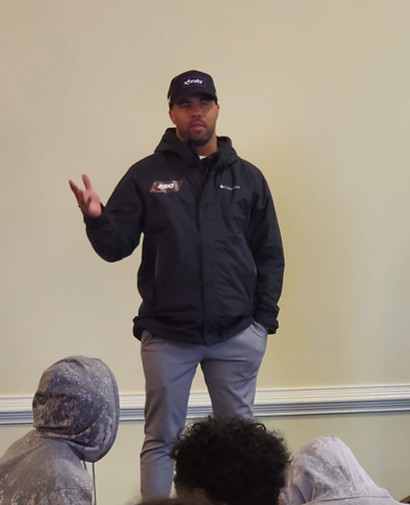
Building Leaders Through Access and Mentorship
The 100 Black Men of DeKalb County – a chapter of the largest, national mentoring organization in the county – continues to expand its footprint with programs focused on academic excellence, economic empowerment, leadership development, and health & wellness.
The launch of ‘Victory & Values’ represents a strategic expansion of the organization’s impact
- intentionally integrating athletics and STEM to engage youth at an early age while reinforcing core principles such as integrity, accountability, teamwork, and perseverance.
“Our mission has always been to mentor the next generation,” said Vaughn Irons, President-Elect of the 100 Black Men of DeKalb County. “With Terry Cummings joining the brotherhood, along with partners in NASCAR and professional sports, we are creating unprecedented access and exposure for our youth. Victory & Values is about turning inspiration into structured opportunity.”
By connecting elementary and middle school students to professional athletes, executives, STEM professionals, and community leaders, the initiative aims to:
- Increase youth exposure to careers in sports business, engineering, and performance science
- Strengthen mentorship pipelines
- Promote physical wellness and mental resilience
- Build character-driven leadership at an early age
Open Invitation to Youth and Families
All youth are invited to participate in the Victory & Values Initiative, along with the other countless, impactful programs offered by the 100 Black Men of DeKalb County.
Parents and guardians seeking mentorship, leadership development, academic enrichment, and transformative exposure opportunities for their children are encouraged to connect with the organization.
As NBA Legend Terry Cummings’ induction demonstrates, Victory & Values is more than a program — it is a movement designed to build champions in life, not just in sports.
For more information about the Victory & Values Initiative or to enroll a student, contact: 100 Black Men of DeKalb County at Phone at 404.241.1338, info@100bmod.org or Tee Foxx at 404.791.6525,
admin
#NNPA BlackPress
Reflecting on Black History Milestones in Birmingham AL
THE BIRMINGHAM TIMES — As we bring Black History Month to a close here’s a look at some historic Birmingham milestones since the city’s founding.
Published
3 days agoon
February 27, 2026By
admin
Compiled by The Birmingham Times
As we bring Black History Month to a close here’s a look at some historic Birmingham milestones since the city’s founding.
1871—City of Birmingham founded; now the state’s most populous city, Birmingham was established at the crossing of two rail lines near one of the world’s richest mineral deposits.
1885—Birmingham Barons baseball team originally established as Birmingham Coal Barons.
1890—The Penny Savings Bank, founded by the Rev. William Reuben Pettiford in Birmingham, opens, becoming the first Black-owned and Black-operated financial institution in Alabama.
1902—Woodward Building, construction completed on the first of four steel-frame skyscrapers that would make up Birmingham’s “Heaviest Corner on Earth.”

The Tuggle Institute, a boarding school for African American children in Birmingham Alabama, pictured in 1906. (Public Domain)
1903 —Social worker Carrie A. Tuggle opens the Tuggle Institute and School, the first orphan home in Alabama for African American boys. The Institute operated until Tuggle’s death on Nov. 5, 1924, and was later renamed Tuggle Elementary School in 1936.
1904 —Vulcan Statue, the world’s largest cast-iron statue, created as Birmingham’s entry in the St. Louis World’s Fair, was sculpted by Giuseppe Moretti.
1914—Birmingham’s Lyric Theatre was established as one of the first in the South where Black and white audiences could see the same show for the same price, though Black sat in an isolated section with inferior accommodations
1918—Birmingham College and Southern University merged to establish Birmingham-Southern College.
1925—The Pittsburgh of the South, Birmingham, is the largest cast iron and steel producer in the Southern U.S.

The Slossfield Community Center campus included a health clinic, a maternity ward, a recreational center, and an education building. The complex was built between 1936 and 1939 by ACIPCO (American Cast Iron Pipe Company). (National Archives Record Group 69-N)
1939—Slossfield Health Clinic, located in a neighborhood surrounding ACIPCO’s plant, considered one of Birmingham’s most blighted, opens.
1941—The Sisters of Charity of Nazareth (SCN) assume responsibility for a small health clinic in the predominantly African American community of Ensley near Birmingham, Alabama. The clinic later becomes Holy Family Hospital.
1941—World War II. The demand for steel during the war brought Birmingham out of the Great Depression.
1948—Slossfield’s medical center closes in 1948 after World War II. The rest of the Slossfield Community Center campus closed in 1954.
1951—Birmingham Museum of Art, currently home to one of the finest collections in the Southeast, with extensive holdings from around the globe dating from ancient to modern times, opens.
1954—A.G. Gaston Motel founded by entrepreneur and activist A.G. Gaston to provide higher-class service to Black visitors.

The Rev. Fred L. Shuttlesworth and other local Black ministers established the Alabama Christian Movement for Human Rights (ACMHR) during a mass meeting at Birmingham’s Sardis Baptist Church. (File)
1956—The home of Birmingham minister and Civil Rights leader Fred Shuttlesworth is bombed. Although the structure is severely damaged, Shuttlesworth emerges uninjured.
- During a mass meeting at Birmingham’s Sardis Baptist Church, Shuttlesworth and other local Black ministers establish the Alabama Christian Movement for Human Rights (ACMHR). Founded in response to the State of Alabama’s eight-year ban on the NAACP, ACMHR was central to the civil rights movement in Birmingham.
- The Freedom Riders arrive at the Greyhound bus terminal in Montgomery, where they are attacked by an angry mob. The Freedom Ride, an integrated bus trip from Washington, D.C., through the Deep South, was formed to test the 1960 Supreme Court decision prohibiting segregation in bus and train terminal facilities.
1963—After previously establishing the ACMHR and the Southern Christian Leadership Conference (SCLC), Shuttlesworth invites Rev. Martin Luther King, Jr. to Birmingham to lead what becomes the Birmingham Campaign for Desegregation. King writes Letter From Birmingham Jail.
- Sixteenth Street Baptist Church was bombed, killing four young girls in an attack against the Civil Rights Movement and humanity.
1966—Oscar Adams Jr. becomes the first African American to join the Birmingham Bar Association.
1968—Arthur Shores was appointed to the Birmingham City Council, making him the first African American to serve as a councilman.
1970—The Sisters of Charity of Nazareth (SCNs) transfer ownership of Holy Family Hospital to a local non-profit organization, which was renamed Community Hospital. By 1986, the facility was sold and operated as Medical Park West until its closing in 1988. The facility would briefly reopen in 1989 as Community Hospital with 22 beds, only to close it down for good soon thereafter.
1974—J. Richmond Pearson and U.W. Clemon were the first African Americans elected to the Alabama State Senate since Reconstruction.
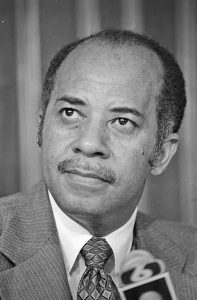
Richard Arrington. (File)
1979—Richard Arrington Jr. was elected as the first African American mayor of Birmingham. Arrington served in that post for nearly 20 years, until his resignation in July 1999.
1980—Oscar Adams Jr. was appointed to the Alabama Supreme Court, making him the first African American justice to hold that office.
1984—J. Mason Davis becomes the first African American president of the Birmingham Bar Association. He is also the first minority adjunct professor at The University of Alabama School of Law, serving from 1972 to 1997.
1986—Reuben Davis and Chris McNair were elected to the County Commission, the first district by district election, and are the first African Americans to serve on the commission.
1991—Carole Smitherman appointed to become the first African American woman to serve as a circuit court judge in Alabama
1992—Birmingham Civil Rights Institute opens its doors at Kelly Ingram Park in the Civil Rights District.
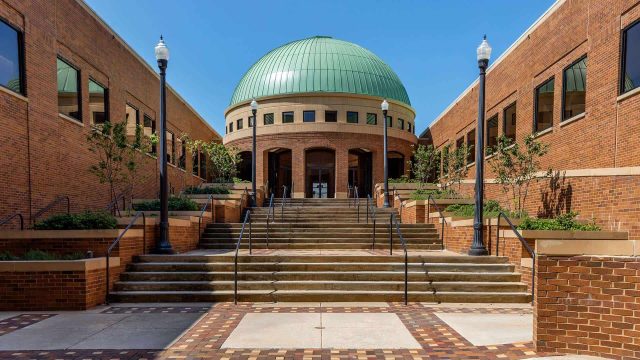
The Birmingham Civil Rights Institute. (File)
1993—Alabama Jazz Hall of Fame opens.
2002—Shelia Smoot elected first Black female Jefferson County Commissioner.
2003—Helen Shores Lee becomes the first African American woman to serve as a judge on the Jefferson County Circuit Court.
2005—Condoleezza Rice, a Birmingham native, is named U.S. Secretary of State.
2008-11—Jefferson County and creditors attempt to reach a settlement of the $3.14 billion sewer debt, but any deal would need to erase $1 billion or more of that debt.
2009—Carole Smitherman becomes Birmingham’s first African American female mayor.
2010—Railroad Park, a 19-acre park, opened, becoming a catalyst for revitalization in downtown Birmingham
2011—A massive storm in April, causing numerous powerful tornadoes, rips through the southeastern United States, killing 250 people in Alabama, including 20 people in Jefferson County communities of Pleasant Grove (10), Concord (6), Cahaba Heights (1), Pratt City (1), Forestdale (1), and McDonald Chapel (1).

In 2012 the Jefferson County Commission voted 3-2 to close the inpatient care unit and emergency room at Cooper Green Mercy Hospital. (File)
2012—Cooper Green Mercy Hospital downsized. The Jefferson County Commission votes 3-2 to close the inpatient care unit and emergency room at Cooper Green following weeks of debate and protests from community leaders who have begged the county to continue operating the facility for the sick and poor.
2016—Lynneice Washington elected District Attorney for the Bessemer Cutoff, the first African American DA in the state of Alabama.
2016—Theo Lawson was named the first African American Jefferson County attorney.
2016—Representative Terri Sewell introduces legislation leading to Birmingham Civil Rights National Monument designation by presidential proclamation one year later.
2017—John Henry joins the Jefferson County Commission Finance Department and becomes the county’s first Black chief financial officer.
2017—Danny Carr and Mark Pettway were elected the county’s first Black district attorney and first Black sheriff, respectively.
2019—Walter Gonsoulin was named the first permanent African American superintendent of the Jefferson County School System
2020—Felicia Rucker-Sumerlin was named the first female Deputy Chief in the 200-year history of the Jefferson County Sheriff’s Office.
2020—Elisabeth French becomes the first woman selected to serve as Presiding Judge in Jefferson County’s 200-year history. She will oversee the 10th Judicial Circuit, the largest in Alabama’s Judicial System.
2021—Ashley M. Jones, founder of the Magic City Poetry Festival, is named Poet Laureate for Alabama, making her the first Black Poet Laureate for the state and the youngest person to hold the position.
2022—Dr. Adolphus Jackson of Birmingham is elected President of the Alabama Dental Association, the first African American to serve as president of the state Association.
2022—Birmingham Mayor Randall Woodfin issues a proclamation declaring March 18 Reverend Fred Shuttlesworth Day, the 100th anniversary of the leader’s birth.
2023—Writer and educator Salaam Green becomes the city’s first poet laureate.
2024—Democrats Yashiba “Red” Blanchard and Jameria Moore on Tuesday became the first Black female judges elected to Probate Court in Jefferson County, Alabama.
2024—Myrna Carter Jackson, a Birmingham civic leader and Foot Soldier who participated in marches, sit-ins, demonstrations, and other Civil Rights activities, dies. She was 82.
2024—Hezekiah Jackson IV, who served as president of the Metro Birmingham NAACP, Birmingham Citizens Advisory Board, and the Inglenook Neighborhood Association, dies. He was 65.
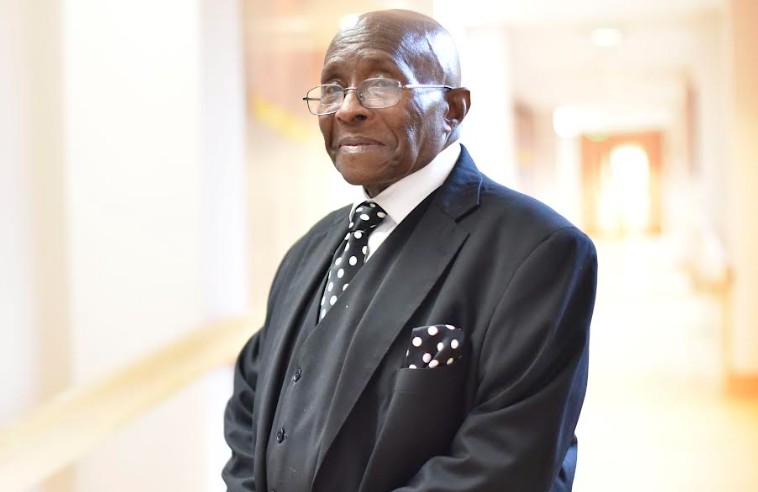
For decades, Bishop Calvin Woods Sr., was one of Birmingham’s leading voices for equality. (File)
2025—Judge Carole Smitherman retires after 50 years in law and politics in Birmingham, including being the first Black woman hired as a deputy district attorney in Jefferson County and becoming the city’s first Black woman municipal and circuit court judge.
2025—Bishop Calvin Woods Sr., distinguished Birmingham Civil Rights leader and longtime pastor of Shiloh Baptist Church in Norwood, dies. He was 91.
2025—Former U.S. Attorney General Eric Holder Jr. accepts the prestigious 202d L. Shuttlesworth Human Rights Award at the downtown Sheraton.
2026—Claudette Colvin, who refused to move to a bus seat at the start of the Civil Rights Movement, dies at 86. Homegoing celebration was held at Greater Shiloh Missionary Baptist Church in SW Birmingham.
Source: The Birmingham Times, 1963: How The Birmingham Civil Rights Movement Changed America and the World; City of Birmingham Public Library; Associated Press; blackpast.org; Politics and Welfare in Birmingham, 1900–1975.
admin
#NNPA BlackPress
OP-ED: One Hundred Years of Black Workers Telling the Truth
NNPA NEWSWIRE — … history provides a framework for understanding what happened in Minnesota this January, when Black journalists Don Lemon and Georgia Fort were arrested after covering a protest inside a church opposing U.S. Immigration and Customs Enforcement activity in the area. The message was unmistakable: documenting dissent can itself be treated as a crime.
Published
4 days agoon
February 26, 2026By
admin
By Fred Redmond, Secretary Treasurer AFL-CIO
In 1917, A. Philip Randolph and Chandler Owen launched The Messenger, a pro-labor, anti-war magazine that connected racism to exploitation and demanded justice for Black workers. Two years later, the federal government responded with tactics of targeted censorship—surveillance, harassment and threats of prosecution—and branded a small Black labor magazine “the most dangerous” publication in the country simply for encouraging Black workers to organize.
More than a century later, two highly respected Black journalists—Don Lemon and Georgia Fort—are handcuffed and indicted for filming a protest inside a church. The tools have changed, but the oppressive government playbook has not.
That continuity matters as we mark 100 years since the launch of Negro History Week, founded in February 1926 by Carter G. Woodson. Negro History Week rejected the lie that Black people had no history worth teaching and no role worth remembering. It challenged an education system that erased Black achievement and a public narrative that treated Black people as a problem, not a people. What later became Black History Month grew from that project of memory and resistance. From its earliest days, Black history celebrations were about more than remembrance. They also were acts of resistance, challenging the ongoing use of law, fear and surveillance to silence Black workers and suppress the truth about power in this country.
That pairing matters: The birth of Negro History Week alongside the rise of an apparatus built to monitor and suppress Black labor dissent. The same government that denied Black people their history also treated them as a threat when they spoke collectively as workers. When Black workers asserted their right to organize and be heard, they faced not just employer retaliation, but state repression.
Randolph went on to organize the Brotherhood of Sleeping Car Porters, the first major Black-led union, and was under constant federal surveillance. As Black workers organized in factories, on farms and in service jobs across the country, local police and FBI “Red Squads” and federal counterintelligence programs infiltrated meetings, built massive files, and worked to neutralize leaders who linked racial justice to workplace democracy.
That history provides a framework for understanding what happened in Minnesota this January, when Black journalists Don Lemon and Georgia Fort were arrested after covering a protest inside a church opposing U.S. Immigration and Customs Enforcement activity in the area. The message was unmistakable: documenting dissent can itself be treated as a crime.
At the same time, major media outlets are shrinking their newsrooms and walking away from race coverage. The Washington Post recently laid off some 300 journalists, including race and ethnicity reporters. In late 2025, NBC News shuttered entire teams dedicated to covering Black, Latino and Asian American, Native Hawaiian and Pacific Islander stories. In Pittsburgh, the 240‑year‑old Post‑Gazette is being shut down by its owners, who responded to a court order requiring them to honor The NewsGuild‑CWA (TNG-CWA) journalists’ contract after years of striking. When powerful newsrooms dismantle the very beats created after 2020 to cover racism and inequality, they send a different version of the same message: some truths about power are no longer welcome.
The National Writers Union said the arrests “set a disastrous precedent for press freedom in the United States,” and the National Association of Black Journalists called on the government to “halt all retaliatory posture toward journalists.” SAG‑AFTRA has condemned the arrests of Fort and Lemon, a member, and unions like TNG‑CWA are warning that union‑busting, mass layoffs, and criminal charges against journalists are part of the same effort to make it dangerous for workers to tell the truth.
This Black History Month, the labor movement must be clear: the right to organize and the right to dissent stand or fall together. There is no freedom of association if workers cannot gather, speak and be heard. When Black journalists are criminalized for documenting protest, the real target is the possibility of multiracial worker power. If true worker power and economic dignity are to have a future, it will be because the labor movement continues to refuse that silence.
The AFL-CIO recognizes that the same tactics used to quash Black voices are used to suppress all our voices—on shop floors, in independent media, in the streets, on picket lines and in places of worship. We stand with our union brothers, sisters and siblings in insisting that the First Amendment is a right and a core worker protection, not a luxury.
A century ago, Woodson insisted that Black people had a history worth telling and Randolph told Black workers they deserved more than exploitation. The government tried to silence them. This Black History Month, the question remains the same: Will Black truth tellers be honored or handcuffed?
The labor movement’s answer must be clear. We stand with Black workers and Black journalists in their right to dissent, to document, and to demand a better future.
Fred Redmond, the highest-ranking African American labor official in history, is the secretary-treasurer of the AFL-CIO, the nation’s largest labor federation, representing 64 unions and nearly 15 million workers.
admin
SEARCH POST NEWS GROUP
CHECK OUT THE LATEST ISSUE OF THE OAKLAND POST

ADVERTISEMENT
WORK FROM HOME
Home-based business with potential monthly income of $10K+ per month. A proven training system and website provided to maximize business effectiveness. Perfect job to earn side and primary income. Contact Lynne for more details: Lynne4npusa@gmail.com 800-334-0540


PRESS ROOM: NBA Hall of Fame Nominee Terry Cummings Joins 100 Black Men of DeKalb County to Launch Victory & Values Initiative

Reflecting on Black History Milestones in Birmingham AL

OP-ED: One Hundred Years of Black Workers Telling the Truth

PRESS ROOM: Civil Rights TV Launches in Selma as the World’s First 24/7 Civil Rights Television Network

Advancements in solar technology that are changing the way we power the world

U.S. manufacturing rebounds – how foundry services are adapting to rising demand

Why has blood testing become so popular in today’s world?

Ghana Mourns a Son of the African World

OP-ED: Trump’s Policies Hurt Black America—and Everyone Else

OP-ED: Meta Deleted Me. I Still Don’t Know Why. And neither will you.

More than a Mission: Paying It Forward for the Future of Education

Avoid Eviction This Season: Landlord Checklist for Stable Tenancies

How chronic back problems affect Black communities differently

How cancer care is evolving with modern medicine

Diabetes disparity: Understanding Type 2 risks for Black Americans

Life Expectancy in Marin City, a Black Community, Is 15-17 Years Less than the Rest of Marin County

Oakland Post: Week of January 28, 2025 – February 3, 2026

Community Celebrates Turner Group Construction Company as Collins Drive Becomes Turner Group Drive

California Launches Study on Mileage Tax to Potentially Replace Gas Tax as Republicans Push Back

Discrimination in City Contracts

Oakland Post: Week of January 21 – 27, 2026

Book Review: Books on Black History and Black Life for Kids

Medi-Cal Cares for You and Your Baby Every Step of the Way

COMMENTARY: The Biases We Don’t See — Preventing AI-Driven Inequality in Health Care

After Don Lemon’s Arrest, Black Officials Raise Concerns About Independent Black Media

Post Newspaper Invites NNPA to Join Nationwide Probate Reform Initiative

OP-ED: The Dream Cannot be Realized Without Financial Freedom

COMMENTARY: The National Protest Must Be Accompanied with Our Votes

Four Stolen Futures: Will H-E-B Do The Right Thing?

Black History Events in the East Bay

Hyundai Ioniq 5 Parking, Safety, and 360 View #shorts

2025 Ioniq 5 New Wiper & Powerful Performance! #shorts

Electric SUV Range: Is 259 Miles Enough? #shorts

EV Charging: How Fast Can You Charge an Electric Vehicle? #shorts

Biometric Cooling… Messaging Seats…Come on! 2025 Infiniti QX80 Autograph 4WD

Charged Up: Witness the Magic of a Fully Electric Car! #shorts

Range Rover Sport PHEV Included…: See What’s Inside This Luxury SUV! #shorts

Invisible Hood View: Perfect Parking with X-Ray Vision! #shorts

AI Is Reshaping Black Healthcare: Promise, Peril, and the Push for Improved Results in California

ESSAY: Technology and Medicine, a Primary Care Point of View

Sanctuary Cities

The RESISTANCE – FREEDOM NOW

STATE OF THE PEOPLE: Freddie

ECONOMIC BOYCOTT DAY!!!!!

I told You So
Trending
-

 Activism4 weeks ago
Activism4 weeks agoLife Expectancy in Marin City, a Black Community, Is 15-17 Years Less than the Rest of Marin County
-

 Activism4 weeks ago
Activism4 weeks agoOakland Post: Week of January 28, 2025 – February 3, 2026
-

 Activism3 weeks ago
Activism3 weeks agoCommunity Celebrates Turner Group Construction Company as Collins Drive Becomes Turner Group Drive
-

 Business3 weeks ago
Business3 weeks agoCalifornia Launches Study on Mileage Tax to Potentially Replace Gas Tax as Republicans Push Back
-

 Activism3 weeks ago
Activism3 weeks agoDiscrimination in City Contracts
-

 Arts and Culture3 weeks ago
Arts and Culture3 weeks agoBook Review: Books on Black History and Black Life for Kids
-

 Activism4 weeks ago
Activism4 weeks agoMedi-Cal Cares for You and Your Baby Every Step of the Way
-

 Activism3 weeks ago
Activism3 weeks agoCOMMENTARY: The Biases We Don’t See — Preventing AI-Driven Inequality in Health Care
